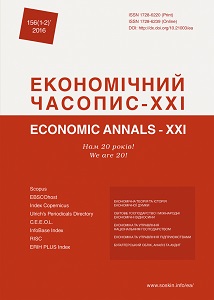Методичні підходи до оцінки ефективності організаційних змін на підприємствах зв’язку
Methodological approaches to evaluation the effectiveness of organisational changes at communication enterprises
Author(s): Tetiana Valeriyivna Grynko, Mykola Koshevoi, Tatyana GviniashviliSubject(s): Economy
Published by: Institute of Society Transformation
Keywords: Change; Efficiency; Enterprise; Development; Indicator
Summary/Abstract: Introduction. In modern conditions of high turbulence and unpredictability of the environment there is an issue of particular relevance to develop a system of management, which would provide continuous capacity to adapt to the changeability of market conditions. Especially it is relevant for communication companies, as enterprises of this area tend to changes based on the active implementation of innovations most of all. The success of the implemented changes within an organisation largely depends on the level of sound systems and process management. The purpose of the article is to develop a methodical approach to evaluating the efficiency of organisational change of communication companies on the basis of the selection and reasoning of indicators of change efficiency, the development of an integrated indicator of change efficiency taking into account the peculiarities of companies’ functioning. Methods. In the course of research the methods of analysis, classification, estimation, synthesis, generalisation and structuring were applied. Results. The paper presents a model for estimating the efficiency of changes in communication companies, based on five consecutive stages. The model allows us to estimate the effectiveness of organisational changes on the basis of four main subsystems, processes, products, organisational culture, organisational structure. It was developed a set of indicators of the efficiency of changes within each subsystem. To estimate the impact of qualitative indicators it was proposed to use the following approach. Depending on whether or not the goals were achieved as a result of the planned changes, among the indicators mentioned above, the analysed enterprises may be referred to one of four groups according to the level of development, for each of which the value of qualitative factor is set. The abovementioned selection of quantitative indicators is proposed in order to determine a coefficient that that takes into account the quantitative estimations. Thus, an integrated indicator of organisational changes efficiency of the communication companies that takes into account indicators of both qualitative and quantitative changes has been developed. Conclusion. The methodical approach proposed in this paper and based on the integrated indicators of complex estimation of quantitative and qualitative factors of efficiency allows us to thoroughly estimate the efficiency of changes taking place at communication enterprises, which in turn enables optimisation of resource consumption, correction of goals and determines program changes.
Journal: Економічний часопис - ХХІ
- Issue Year: 156/2016
- Issue No: 01+02
- Page Range: 78-82
- Page Count: 4
- Language: Ukrainian

